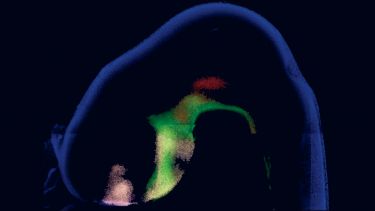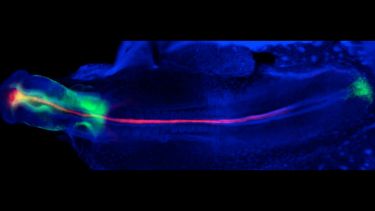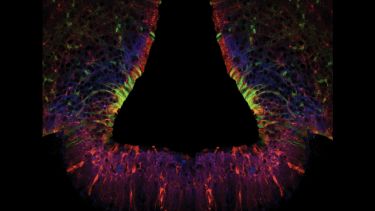Professor Marysia Placzek
School of Biosciences
Professor of Developmental Neurobiology
Full contact details
School of Biosciences
Firth Court
Western Bank
Sheffield
S10 2TN
- Profile
-
Marysia is a Wellcome Trust Investigator and Professor of Developmental Neurobiology in the School of Biosciences. She has inspired staff and students alike with her pioneering leadership.
A driving force behind one of our UniversityŌĆÖs key research facilities, Marysia directed the MRC Centre for Developmental and Biomedical Genetics for many years and oversaw its evolution into the Bateson Centre.
Her initiative and outstanding commitment to her colleagues and students contributed to the ongoing success of research in the Department and the strong focus on developmental biology, and its translation, at the University.
MarysiaŌĆÖs research focuses on the development of the vertebrate hypothalamus and she has earned international acclaim for her work in this field. In 2023 she was awarded the British Society for Developmental Biology Waddington Medal, in recognition of her outstanding research performance as well as services to the subject community.
In 2012 she was awarded an MRC Suffrage Science Heirloom in recognition of her achievements as a leading female scientist.
Like many women, she balances the demands of world-leading research with family commitments, and has been celebrated by The Royal SocietyŌĆÖs ŌĆśParent Carer ScientistŌĆÖ project.
Colleagues agree that ŌĆ£Marysia is not just a role model for female scientists, but for all those with an aspiration to become a leader in their field.ŌĆØ
- ┬ķČ╣╩ėŲĄ interests
-
How the brain develops remains one of the greatest mysteries in science. ┬ķČ╣╩ėŲĄ in the lab focus on the development of a fascinating part of the brain - the hypothalamus ŌĆō the master-controller of physical, behavioural and emotional homeostasis.
Lay summary
In the developing embryos, the hypothalamus is built with precision. This ordered assembly underlies its key role in life. Our research focuses on characterising the stem and progenitor cells that build the hypothalamus and characterising the molecular networks that direct hypothalamic morphogenesis, growth and differentiation. Our work will contribute to understanding the importance of the hypothalamus to robust long-term health and will shed light on diseases and disruptions of homeostasis.
┬ķČ╣╩ėŲĄ summary
The functions of the hypothalamus in mediating homeostasis, and ensuring that brain and body function optimally, are well-known. By contrast, little is understood of how the hypothalamus develops. This knowledge is important, because early indications suggest that deregulation of developmental programmes may underlie complex human pathological conditions, including stress and eating disorders. Our goal is therefore to understand how the hypothalamus develops in the embryo and how the proper embryonic assembly of the hypothalamus holds the key to robust adult function.
We focus in particular on five key areas:
- The role of adjacent tissues in inducing multipotent embryonic hypothalamic progenitor cells
- The characterisation of multipotent embryonic hypothalamic progenitor cells, and identification of cues that maintain progenitor cells, or promote their differentiation
- The self-organisation and morphogenesis of hypothalamic progenitor cells through integrated growth and differentiation
- The cellular and molecular events that underlie the integrated assembly of the hypothalamo-pituitary neuraxis
- The characterization of stem/progenitor-like tanycytes in the adult hypothalamus
We use a range of animal model systems (chick, mouse, zebrafish) and combine in vivo and ex vivo approaches with state-of-the-art transcriptomic, imaging, and gain-and loss-of-function approaches.
- Publications
-
Show: Featured publications All publications
Featured publications
Journal articles
- . eLife, 12.


- . Cell Reports, 38(3).


- . Scientific Reports, 11(1).


- . PLOS Biology, 18(3).


- . International Journal of Developmental Biology, 62(1-3), 221-230.


- . Development, 144, 3278-3288.


- . Comprehensive Physiology, 6(2), 623-643.


- . Nat Commun, 4, 2049.


- . Development.


- .


Chapters
Preprints
All publications
Journal articles
- . Engineered Regeneration, 5(1), 11-20.


- . BIO-PROTOCOL, 13(23).


- . Development, 150(23).


- . eLife, 12.


- . Current Opinion in Endocrine and Metabolic ┬ķČ╣╩ėŲĄ, 26.


- . Frontiers in Neuroscience, 16.


- . Cell Reports, 38(3).


- . Scientific Reports, 11(1).


- . Development, 148(6).


- . Philosophical Transactions of the Royal Society B: Biological Sciences, 375(1809).


- . Epilepsia.


- . PLOS Biology, 18(3).


- . The International Journal of Developmental Biology.


- . Journal of Neuroendocrinology, 31(5).


- . International Journal of Developmental Biology, 62(1-3), 221-230.


- . Development, 144, 3278-3288.


- . Human Molecular Genetics, 26(11), 1992-2005.


- . Development, 143(14), 2651-2663.


- . Comprehensive Physiology, 6(2), 623-643.


- . Comprehensive Physiology, 6(2), 623-643.


- . Development, 142(22), 3821-3832.


- . Neuroscience Letters, 562, 107.


- . BMC Neurosci, 14, 126.


- . Neurosci Lett, 553, 104-109.


- . Nat Commun, 4, 2049.


- . Development, 140(5), 1111-1122.


- . CELL STEM CELL, 12(1), 10-11.


- . Curr Top Dev Biol, 106, 49-88.


- . Neuroscience Letters.


- . Development, 138(12), 2613-2624.


- . Development, 138(10), 1893-1902.


- . J Neurosci, 30(45), 14925-14930.


- . Development, 135(20), 3325-3331.


- . Methods Mol Biol, 461, 325-335.


- . Dev Cell, 11(6), 873-885.


- . NAT REV GENET, 7(11), 841-850.


- . Dev Biol, 294(2), 554-563.


- . Development, 132(24), 5539-5551.


- . Development, 132(23), 5185-5197.


- Molecular control of area a cell specification to anterior floor plate fate. MECHANISMS OF DEVELOPMENT, 122, S164-S165.


- Neurogenesis in the chick hypothalamus. MECHANISMS OF DEVELOPMENT, 122, S177-S177.


- . Nat Rev Neurosci, 6(3), 230-240.


- . Curr Opin Neurobiol, 15(1), 7-13.


- . Development, 130(20), 4809-4821.


- . Curr Biol, 12(1), 47-52.


- . Curr Biol, 11(15), R616-R619.


- . Cell Mol Life Sci, 57(12), 1695-1708.


- Introduction: preface to the Hedgehog family of proteins review volume. CELL MOL LIFE SCI, 57(12), 1671-1671.


- . Biochemical Society Transactions, 28(5), A139-A139.


- Development of chick axial mesoderm: specification of prechordal mesoderm by anterior endoderm-derived TGFbeta family signalling.. Development, 127(13), 2795-2809.


- . Curr Opin Neurobiol, 10(1), 15-22.


- Rostro-ventral patterning of the neural tube ventral midline. EUROPEAN JOURNAL OF NEUROSCIENCE, 12, 12-12.


- Developmental genetics in Sheffield: a meeting point for Hedgehog researchers.. Int J Dev Biol, 44(1), 65-72.


- . Curr Biol, 9(14), R506-R510.


- Differential patterning of ventral midline cells by axial mesoderm is regulated by BMP7 and chordin.. Development, 126(2), 397-408.


- . Methods Mol Biol, 97, 293-304.


- . SCIENCE, 282(5394), 1654-1657.


- . Science, 282(5394), 1654-1657.


- A role for SOX1 in neural determination.. Development, 125(10), 1967-1978.


- . Principles of Medical Biology, 11(C), 153-165.


- . Cell, 90(2), 257-269.


- . Curr Biol, 6(5), 526-529.


- . Dev Biol, 170(2), 299-313.


- . Curr Opin Genet Dev, 5(4), 499-506.


- SONIC HEDGEHOG INDUCES THE DIFFERENTIATION OF VENTRAL FOREBRAIN NEURONS - A COMMON SIGNAL FOR VENTRAL PATTERNING WITHIN THE NEURAL-TUBE (VOL 81, PG 747, 1995). CELL, 82(1), U11-U11.


- . Cell, 81(5), 747-756.


- . Cell, 76(4), 761-775.


- . Trends Neurosci, 16(8), 316-323.


- Induction of floor plate differentiation by contact-dependent, homeogenetic signals.. Development, 117(1), 205-218.


- . Trends Neurosci, 14(7), 303-310.


- . Cell, 64(3), 635-647.


- Control of dorsoventral pattern in vertebrate neural development: induction and polarizing properties of the floor plate.. Dev Suppl, Suppl 2, 105-122.


- . Science, 250(4983), 985-988.


- Orientation of commissural axons in vitro in response to a floor plate-derived chemoattractant.. Development, 110(1), 19-30.


- . Cold Spring Harb Symp Quant Biol, 55, 279-289.


- . Proc Natl Acad Sci U S A, 86(15), 5678-5682.


- . J Virol, 63(3), 1448-1450.


- . Ciba Found Symp, 144, 255-276.


- . Nature, 336(6201), 775-778.


- . Nucleic Acids Res, 14(21), 8231-8245.


- . J Virol, 59(3), 535-544.


- . Nature Reviews Endocrinology.


- . Development.


- . Nature Communications, 14(1).


- . Disease Models & Mechanisms.


- . Yearbook of Paediatric Endocrinology.


- .


Chapters
- , Current Topics in Developmental Biology (pp. 83-123). Elsevier


- , Masterclass in Neuroendocrinology (pp. 3-30). Springer International Publishing


- , Larsen's Human Embryology (pp. v-v). Elsevier


- , Imaging the Central Nervous System of the Fetus and Neonate (pp. 3-12). CRC Press


- , Brain Repair (pp. 199-211). Macmillan Education UK


Conference proceedings papers
- Adult neurogenesis is impaired in pink1-/- zebrafish (Danio rerio). MOVEMENT DISORDERS, Vol. 33 (pp S605-S605)


- Adult stem cells in the human and mouse spinal cord: What are their characteristics and can they migrate and replicate upon exposure to growth factors. BRITISH JOURNAL OF SURGERY, Vol. 100 (pp 38-39)


- . HEART, Vol. 98 (pp A4-A4)


- . HEART, Vol. 97(20) (pp 15-15)


- . HEART, Vol. 95(22)


- . MECHANISMS OF DEVELOPMENT, Vol. 126 (pp S8-S8)


- . MECHANISMS OF DEVELOPMENT, Vol. 126 (pp S210-S210)


- . MECHANISMS OF DEVELOPMENT, Vol. 126 (pp S220-S220)


- . MECHANISMS OF DEVELOPMENT, Vol. 126 (pp S142-S142)


- . DEVELOPMENTAL BIOLOGY, Vol. 331(2) (pp 467-468)


- A NOVEL CHICK EMBRYO MODEL REVEALS ENDOTHELIN RECEPTOR B IS ESSENTIAL FOR COLLATERAL VESSEL DEVELOPMENT. HEART, Vol. 95 (pp A65-A65)


- A role for BMPs in the formation of the ventral hypothalamus.. DEVELOPMENTAL BIOLOGY, Vol. 259(2) (pp 492-492)


Preprints
- . eLife, 12.
- ┬ķČ╣╩ėŲĄ group
-
Current lab members:
- Dr Sarah Burbridge (┬ķČ╣╩ėŲĄ Assistant)
- Dr Kavitha Chinnaiya (┬ķČ╣╩ėŲĄ Associate)
- Dr Elizabeth Manning (┬ķČ╣╩ėŲĄ Associate)
- Dr Elsie Place (┬ķČ╣╩ėŲĄ Associate)
- Mr Ian Groves (PhD student; joint with Dr Alex Fletcher)
- Ms Bethany James (PhD student; joint with Professor Andrew Furley and Dr Ivana Barbaric)
- Teaching activities
-
I lecture and teach on several undergraduate and MSc courses, including second, third year and masters courses in developmental biology, developmental neurobiology and stem/ regenerative biology. I am module co-ordinator for Developmental Neurobiology (second year module).
My group annually takes several undergraduate and masters students into the lab for their final dissertation/research projects and most years we have summer students working with us.
I am an invited editor of ŌĆśPrinciples of Development BiologyŌĆÖ (7th ed).
- Professional activities and memberships
-
- Chair: Wellcome Trust Expert Review Group: Cell and Developmental Biology
- Scientific Advisory Board member: GW4 Biomed MRC DTP
Presentations
I am invited to present research talks at international meetings in numerous fields, including Developmental biology, Neuroscience, Neuroendocrinology, Endocrinology
Examination bodies
- External Examiner for Development, Regeneration and Stem Cells, University of Edinburgh (2016-2019)
- External Examiner for Part 2 Zoology, University of Cambridge (2013-2015)
Professional societies
- British Society for Developmental Biology
- Society for Endocrinology
- Society for Neuroscience
- Society for Anatomy
Peer review activity
I am an ad hoc reviewer for many journals (including Cell, Nature Neuroscience, Current Biology, Development, Developmental Cell, PLoS Biology) and for Grant awarding bodies (including Wellcome Trust, BBSRC, MRC, ERC, Hong Kong ┬ķČ╣╩ėŲĄ Council, Human Science Frontiers Program; NIHR). I have been involved in many promotion reviews for scientists in my field of research in the UK, USA and elsewhere, act as a Content Expert (eg LarsenŌĆÖs Human Embryology 4th Ed (Ed: G. Schoenwolf)) and editor (WolpertŌĆÖs Principlels of Developmental Biology 7th Ed).



